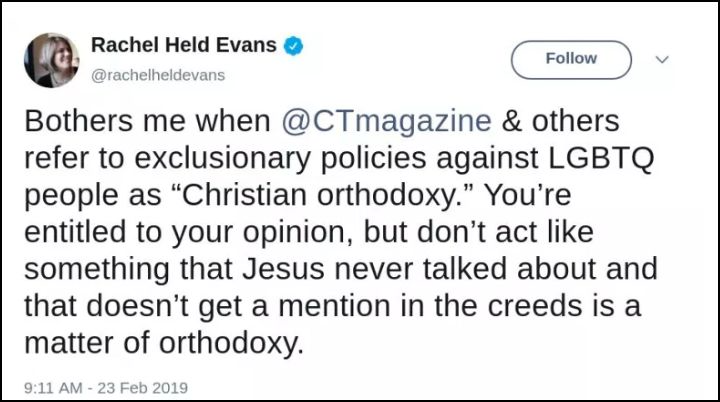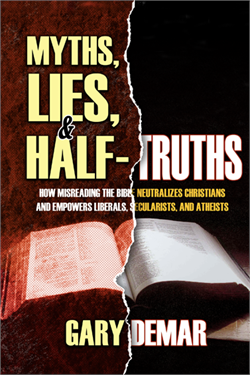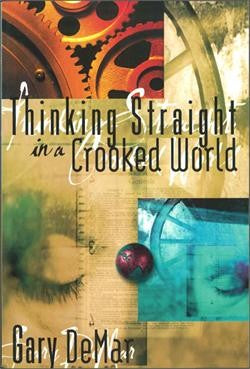Rachel Held Evans (1981-2019) was a Christian columnist, blogger, and author who supported same-sex marriage because “Jesus never talked about it.” This is a frequent argument for supporters of same-sex marriage and the LGBTQ+ agenda. She also stated that the creeds don’t mention anything about homosexuality. So here we are today where “The town of Worcester, Massachusetts, voted to become a ‘sanctuary city’ for transgender and ‘gender diverse people.’” Jesus never talked about transgender people, so…

For someone who wrote about the Bible, she didn’t seem to know much about the Bible or the historic Christian creeds and their purpose. It’s shocking that she would use such a trite and failed argument that has been answered numerous times.
The Christian creeds like the Apostles’ Creed (120-250), Nicene Creed (325), Chalcedonian Creed (451), and the Athanasian Creed (500) deal with very specific theological issues. None of the historic creeds touch on marriage, church discipline, tithing, law, missions, and a whole host of other theological topics. That wasn’t their purpose.

Myths, Lies, and Half-Truths
Myths, Lies, and Half-Truths takes a closer look at God's Word and applies it to erroneous misinterpretations of the Bible that have resulted in a virtual shut-down of the church's full-orbed mission in the world (Acts 20:27). Due to these mistaken interpretations and applications of popular Bible texts to contemporary issues, the Christian faith is being thrown out and trampled under foot by men (Matt. 5:13).
Buy NowHistoric confessions address a multitude of topics, for example, the Westminster Confession of Faith and its Shorter and Larger Catechisms (1647). Here’s the question and answer for Question 139 from the Larger Catechism regarding the Seventh Commandment:
Q. What are the sins forbidden in the seventh commandment?
A. The sins forbidden in the seventh commandment, besides the neglect of the duties required, are, adultery, fornication, rape, incest, sodomy, and all unnatural lusts…
Here’s how the 1689 Baptist Confession of Faith defines marriage: “1. Marriage is to be between one man and one woman; neither is it lawful for any man to have more than one wife, nor for any woman to have more than one husband at the same time. (Genesis 2:24; Malachi 2:15; Matthew 19:5-6).”
I’m always amazed when homosexuals and those who support same-sex relationships try to use the Bible to support homosexuality. It can’t be done. Let’s start with the Hebrew Scriptures.
“You shall not lie with a male as one lies with a female; it is an abomination” (Lev. 18:22; 20:13). Abomination is a term of strong disapproval in Hebrew (to’evah). It is used five times in Leviticus 18 (vv. 22, 26, 27, 29, 30) and once in 20:13. “It is more common in Deuteronomy (17 times), in Proverbs (21 times), and in Ezekiel (43 times). Other writers use it less often. It comes from a root meaning ‘to hate’ or ‘abhor.’ An abomination is literally something detestable and hated by God (e.g., Prov. 6:16; 11:1).”[1]
The morality in the New Testament is based on the morality found in the Older Testament. For example, the Greatest Commandment (Matt 19:19; Mark 12:31; Luke 10:27; Rom 13:9; Gal. 5:14; James 2:8) is actually a quotation from the Older Testament: “You shall not take vengeance, nor bear any grudge against the sons of your people, but you shall love your neighbor as yourself; I am the Lord” (Lev. 19:18). Notice that this love command is sandwiched between chapters that describe homosexuality as an “abomination.” This means loving your neighbor does not mean always loving what your neighbor does, especially when that behavior is condemned in the Bible and contrary to how we were designed (Gen. 1-2).
A standard argument against the Bible’s prohibition of homosexuality is that Jesus never mentions it. If Jesus not mentioning something means it’s not prohibited, then we are in some real moral trouble. Jesus didn’t condemn rape (Deut. 22:25-26), sex with animals (Ex. 22:29), sex with a minor, incest (Lev. 18:6-18), abortion (Ex. 21:22-25), kidnapping (Deut. 24:7), arson (Ex. 22:6), or tripping blind people (Lev. 19:14). Following Evans’s line of reasoning, Jesus must not have been opposed to rape, incest, bestiality, sex with minors, abortion, or tripping blind people. This is a terrible argument, yet it is used repeatedly by homosexual advocates.
The Bible defines “natural” sexual relationships in Genesis 2:18-25. Anything outside the norm is abnormal. Jesus confirms the creation model in Matthew 19:4-6, and by definition condemns any other type of sexual relationship: “Have you not read that He who created them from the beginning made them male and female, and said, ‘For this reason a man shall leave his father and mother and be joined to his wife, and the two shall become one flesh’? ‘So they are no longer two, but one flesh. What therefore God has joined together, let no man separate.’”
If my wife said to my children when they were younger, “stay in the house while your dad is fixing the roof,” she didn’t have to follow this up by saying “don’t go outside.” The positive standard (stay in the house) implies the negative prohibition (don’t go outside).
The speed limit sign that reads “55” includes a prohibition of any speed over “55” without ever saying don’t go “65 miles per hour.” Based on the Genesis account alone, there is no need for a single verse condemning homosexuality (Gen. 1:26-28; 2:18-25). Affirming the heterosexual relationship—one man with one woman—condemns homosexual relationships. With the norm established, any deviation is by definition abnormal, unnatural, and sinful.

Thinking Straight in a Crooked World
The nursery rhyme "There Was a Crooked Man" is an appropriate description of how sin affects us and our world. We live in a crooked world of ideas evaluated by crooked people. Left to our crooked nature, we can never fully understand what God has planned for us and His world. God has not left us without a corrective solution. He has given us a reliable reference point in the Bible so we can identify the crookedness and straighten it.
Buy NowImplied in Evans’ support for homosexuality is that other Christians should not judge people who engage in same-sex relationships. Paul Copan writes the following in his book True For You, But Not For Me, “It’s been said that the most frequently quoted Bible verse is no longer John 3:16 but Matthew 7:1: ‘Do not judge, or you too will be judged.’” I would add that it’s the most frequently misquoted verse by those who quote the Bible only when they believe it helps their cause.
The context matters. When Jesus condemned judging, he wasn’t implying that we should never make judgments about anything or anyone. After all, a few verses later, Jesus calls certain people “pigs” and “dogs” (Matt. 7:6) and “wolves in sheep’s clothing” (7:15)! Any act of church discipline (1 Cor. 5:5) including rebuking false prophets (1 John 4:1) requires judgment.[2] How are “savage wolves” identified who disrupt the peace and purity of the church? (Acts 20:29) A process of judgment takes place to identify an antichrist (1 John 2:22; 2 John 7).
Jesus said, “Do not judge lest you be judged” (Matt. 7:1; Luke 6:37). But He also said, “Judge with righteous judgment” (John 7:24; see Deut. 16:18). These are not contradictory statements because the context of Jesus’ words in Matthew 7 tells us what He means by “not judging” and what it means to judge with “righteous judgment.” Jesus was condemning those who judge using two standards of morality, one standard for the judge and another for the accused. The Bible maintains—in both the Old and New Testaments—that the standard of judgment must be equal for both parties. (Num. 15:16) “For in the way you judge, you will be judged; and by your standard of measure, it shall be measured to you.” (Matt. 7:2)
Evans fed a false narrative in the name of Jesus Christ. She led people astray.
For the time will come when they will not endure sound doctrine; but wanting to have their ears tickled, they will accumulate for themselves teachers in accordance to their own desires (2 Tim. 4:3).
This was a problem in the early church, and it’s a problem today:
“But false prophets also arose among the people, just as there will also be false teachers among you,” addressing the recipients of his letter, “who will secretly introduce destructive heresies, even denying the Master who bought them, bringing swift destruction upon themselves” (2 Pet. 2:1).
The problem is that Evans was not doing it secretly. She openly bore false witness against the Bible and the faith she claimed to believe.
[1] Gordon J. Wenham, The Book of Leviticus (Grand Rapids, MI: Eerdmans, 1979), 259.
[2] Paul Copan, True For You, But Not For Me: Deflating the Slogans that Leave Christians Speechless (Minneapolis: Bethany, 1998), 32.

